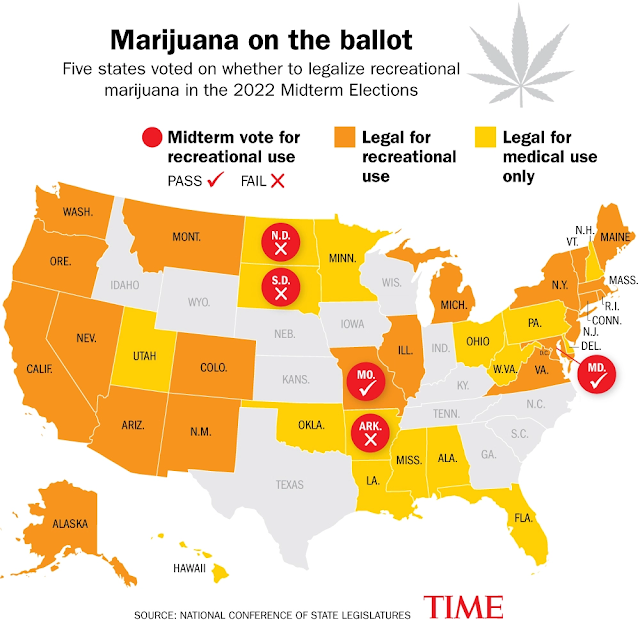Denver is the mile high city, and the 2022 midterm elections have now legalized therapy with magic mushrooms/psilocybin, which has medical uses in treating post-traumatic stress disorder, among other things.
Colorado becomes second state with legalized ‘medicinal psychedelics’ by Olivia Goldhill in Statnews
"Colorado is the second state to legalize psychedelics, following Oregon’s 2020 passage of a similar ballot question. Like Oregon, Colorado plans to create licensed “healing centers” where people can take magic mushrooms under supervision.
“This is a truly historic moment. Colorado voters saw the benefit of regulated access to natural medicines, including psilocybin, so people with PTSD, terminal illness, depression, anxiety and other mental health issues can heal,” Kevin Matthews and Veronica Lightning Horse Perez, leaders of Natural Medicine Colorado, which campaigned for the measure, wrote in a statement emailed to STAT.
...
"The most advanced study for psilocybin, a Phase 2b trial on the drug for treatment-resistant depression published earlier this month, found the drug was effective at inducing remission in many patients, but the results were less striking than in earlier studies."
**************
And from Time Magazine:
Colorado Voted to Decriminalize Psilocybin and Other Psychedelics, by Tara Law
"Colorado voters have approved the broadest psychedelic legalization in the U.S., which would decriminalize five psychedelic substances and enable adults to receive psychedelics at licensed centers.
...
"The ballot measure decriminalizes the possession of certain psychedelic drugs for personal use in the state and specifically legalize psilocybin, the psychedelic component of magic mushrooms, for use at licensed facilities starting in 2024. (In those ways, it’s similar to 2020 measures approved in Oregon, which decriminalized possession of small amounts of drugs in 2021 and is launching a psilocybin access program in 2023.)
"However, Colorado’s Proposition 122 goes further in several ways. In addition to decriminalizing possession, it decriminalizes the growing and sharing of five psychedelics for personal use: psilocybin, psilocyn (a psychedelic also found in magic mushrooms), dimethyltryptamine (commonly known as DMT, which is found in plants and animals, including certain tree frogs), ibogaine (derived from the bark of an African shrub), and mescaline (which is primarily found in cacti; however, Prop 122 excludes peyote). It also clears a pathway for the use of all these psychedelics at “healing centers”—facilities licensed by the state’s Department of Regulatory Agencies where the public can buy, consume, and take psychedelics under supervision. The regulated access program would initially be limited to psilocybin, which would launch in late 2024, but if recommended by a Natural Medicine Advisory Board appointed by the governor, it could be expanded to include DMT, ibogaine, and mescaline in 2026."




